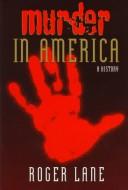Check nearby libraries
Buy this book

This book is the first serious study of the history of criminal homicide in America, reaching from precolonial times to the age of the O. J. Simpson trial. Noted historian Roger Lane provides this much-needed overview of the history of murder and our culture's responses to it. Lane demonstrates that the study of murder can provide important clues about the way society actually works, its fears and tensions, its concept of justice, and the value it places on different kinds of human life.
Roger Lane simply asks the same questions of the past that we ask of the present: What causes murder rates to go up or down? How efficiently or fairly has the justice system worked in dealing with homicide? What are or have been the roles of economic difference and family structure, of the courts and the media, of the Wild West and the urban Industrial Revolution, of Indian warfare and African-American slavery?
But if the questions are familiar, Lane shows us that the answers cannot be fitted neatly into boxes we now label either "liberal" or "conservative." They will surprise most readers.
Check nearby libraries
Buy this book

Previews available in: English
Subjects
Murder, History, Murder, united statesPlaces
United States| Edition | Availability |
|---|---|
| 1 |
aaaa
|
Book Details
Edition Notes
Includes bibliographical references (p. 355-365) and index.
Classifications
The Physical Object
ID Numbers
Source records
Scriblio MARC recordIthaca College Library MARC record
Internet Archive item record
Internet Archive item record
Better World Books record
Library of Congress MARC record
Better World Books record
marc_columbia MARC record
Work Description
This book is the first serious study of the history of criminal homicide in America, reaching from precolonial times to the age of the O. J. Simpson trial. Noted historian Roger Lane provides this much-needed overview of the history of murder and our culture's responses to it. Lane demonstrates that the study of murder can provide important clues about the way society actually works, its fears and tensions, its concept of justice, and the value it places on different kinds of human life. Roger Lane simply asks the same questions of the past that we ask of the present: What causes murder rates to go up or down? How efficiently or fairly has the justice system worked in dealing with homicide? What are or have been the roles of economic difference and family structure, of the courts and the media, of the Wild West and the urban Industrial Revolution, of Indian warfare and African-American slavery? But if the questions are familiar, Lane shows us that the answers cannot be fitted neatly into boxes we now label either "liberal" or "conservative." They will surprise most readers.
Community Reviews (0)
Feedback?History
- Created April 1, 2008
- 17 revisions
Wikipedia citation
×CloseCopy and paste this code into your Wikipedia page. Need help?
| August 6, 2024 | Edited by MARC Bot | import existing book |
| September 17, 2022 | Edited by ImportBot | import existing book |
| November 23, 2020 | Edited by MARC Bot | import existing book |
| August 29, 2020 | Edited by ImportBot | import existing book |
| April 1, 2008 | Created by an anonymous user | Imported from Scriblio MARC record |










